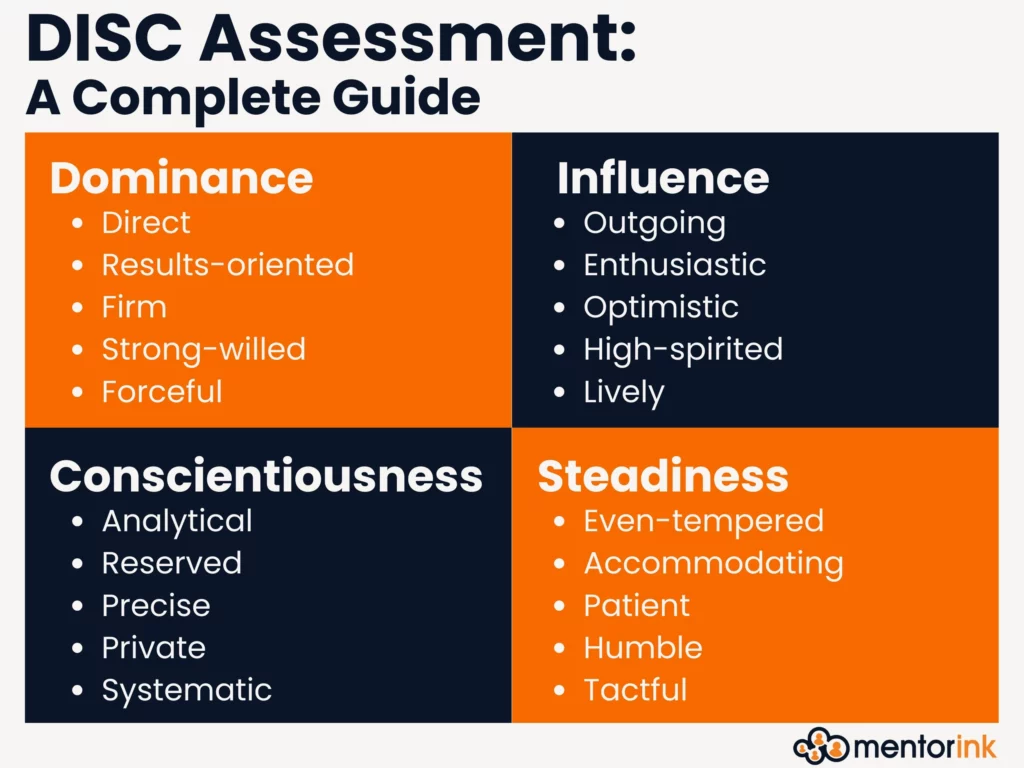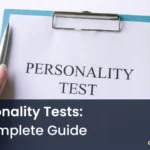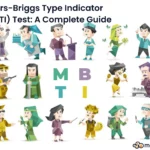
In the current business context, an understanding of the nuances of human communication and behavioral styles has become a vital competence.Each individual who joins a team contributes a better perspective to addressing challenges, collaborating with others, guiding organizations, and resolving problems in professional life.
Nevertheless, a considerable number of misunderstandings arise that individuals communicate and interpret information in a manner that differs from one another. The DISC Personality Test is a well-known tool that is designed to assist individuals and teams in enhancing communication, resolving disagreements, and improving productivity.
Furthermore, the DISC Testing can be a beneficial resource for both managers seeking to foster a unified team and individuals striving to enhance their self-awareness, which contributes to personal and professional development.
What is a DISC Assessment and Personality Test?
The DISC Assessment functions as a behavioral apparatus intended to evaluate a person’s personality and interpersonal interaction style. The foundation of this concept lies in the DISC theory, which was initially created by psychologist William Marston during the 1920s. Marston’s book of Emotions of People sketches this psychological test. The DISC model frankly focuses on four key personality traits: Dominance, Influence, Steadiness, and Conscientiousness. The assessment does not evaluate intelligence, aptitude, or emotional well-being; rather, it is centered on comprehending how individuals act and engage with one another.
The DISC Assessment finds extensive application across diverse environments, such as workplaces, educational institutions, and personal improvement initiatives. This enables individuals to gain insight into their strengths, challenges, and preferred communication styles, facilitating more effective interactions with others. In the workplace, recognizing the DISC profiles of team members can enhance collaboration, minimize conflicts, and create a more productive workplace.
The DISC Assessment is notable for its ability to categorize behaviors without judgment. This test totally refrains from categorizing individuals as “good” or “bad,” instead emphasizing their preferences for action and interaction in various situations. Regardless of whether you are a team leader, a CEO, or an individual seeking personal growth, the DISC Assessment offers practical insights that can enhance communication better and foster more harmonious relationships.
What Does DISC Mean?
DISC is an acronym which describes four essential personality traits: Dominance, Influence, Steadiness, and Conscientiousness. These characteristics demonstrate how individuals act and engage with the others around them. Each of these traits is bonded to specific characteristics and preferences that can be assessed using the DISC Personality Test.
Dominance (D)
Those with a high Dominance score tend to be assertive, straightforward, and focused on reaching results. They are motivated by obstacles, rivalry, and the pursuit of success. These kinds of people frequently like to assert themselves in various situations and are often recognized as strong leaders, though they can occasionally be perceived as excessively aggressive or demanding.
Main characteristics:
• Focused on the results
• Confidence in communication
• Analytical thinking
• Thrives in challenging situations
Impact (I)
People with a significant Influence score tend to be sociable, energetic, and focused on interpersonal connections. They flourish in social settings and take satisfaction in influencing others. Individuals in this group are frequently perceived as charming and skilled at fostering connections, yet they can occasionally face challenges with organization or completing tasks.
Main characteristics:
• Outgoing
• Convincing
• Thrives in collaboration
• Hopeful
Steadiness(S)
People who possess a high Steadiness score exhibit serenity, patience, and a cooperative nature. They also appreciate reliability and uniformity, favoring settings where they can assist others and maintain a consistent rhythm. These individuals tend to be credible supporters, yet they might be hesitant to adapt or find it challenging to thrive in stressful situations.
Main characteristics:
• Tranquil and comprising
• Supportive
• Faithful and trustworthy
• Appreciates clear settings
Conscientiousness (C)
Individuals who score high in Conscientiousness tend to be meticulous, thoughtful, and committed to excellence. They often exhibit a strong inclination towards perfectionism, placing a higher value on accuracy and logic rather than on emotional considerations. Although they are competent in problem-solving and adhering to procedures, they might struggle with making swift decisions or thriving in extremely social environments.
Main characteristics:
• Meticulous
• Insightful • Exemplary standards
• Emphasis on precision
How to Take the DISC Test?
One straightforward method for discerning one’s behavioral tendencies in diverse contexts is to engage with the DISC assessment, which typically comprises a series of questions posed in either an online or paper format. The overall process can be defined as follows:
Find a Reputable Provider For DISC Test
You may get the DISC Assessment from a lot of places online, but you should be careful to choose a reliable source for this test. You can get certain tests for free, while others charge for more in-depth studies. You should verify the assessment’s credibility and validity.
Be Honest When Responding to DISC’s Questions
In most cases, the DISC test will ask you to rate the degree to which each part describes you. You should provide the most accurate response you can. Typically, the test takes no more than ten to fifteen minutes to finish.
Showcase Your Outcomes
You will get a personality profile that derives from your answers when you finish the test. Your DISC profile will show you how you normally act in various settings and emphasize your dominant attributes (Dominance, Influence, Steadiness, and Conscientiousness).
Apply the Findings to Your Own Development
You may spend some time thinking over the results after you get them. Is there a connection between your personality and your present job or personal life? This evaluation is not only about finding out what you are good at; it is about finding out where you might need to change your approach to better connect with people.
What are the Benefits of Taking the DISC Test?
People and companies alike can get many advantages from taking the DISC Assessment. Whether your goal is to become more self-aware or to build a more cohesive team, the DISC test can help you achieve your personal and professional goals.
Increased Levels of Self-Awareness
Someone’s communication preferences, behaviors, and manner can be better understood with the use of the test known as DISC. You can improve your behavior awareness as well as responsiveness by being informed of your typical reactions to different situations. Emotional intelligence, of which self-awareness is a part, is essential for achieving success in one’s personal and professional lives.
Improved Cooperation Within Teams
When coworkers on a team use different communication styles, it can lead to confusion and miscommunication. Coworkers and supervisors can benefit from a deeper understanding of each team member’s DISC profile in terms of improved communication and teamwork. Someone on the team may thrive with more direct communication if their Dominance score is strong, while another team member may benefit from a more patient and collaborative approach if their Steadiness score is high.
Resolving Conflicts
An excellent tool for handling conflicts, the DISC Assessment also exposes many personality features. In order to address problems in a way that connects with people and reduce the risk of misunderstandings and friction, it is helpful to understand their motives and actions.
Creating Leaders in The Workplace
Members in positions of leadership can also greatly benefit from taking the DISC test to improve management abilities. The findings of the evaluation can help leaders improve their communication and leadership styles. Thus, they also can inspire and encourage their colleagues more effectively.
Advancement in One’s Career
The DISC Assessment is a tool that can help you advance in your career and in your personal life. Taking the DISC test can help you understand yourself and others better, which can have positive effects in many areas of your life, including your relationships, job, and leadership abilities.
How to Apply DISC Assessment Results at Work
After completing the DISC Assessment and receiving your results, the subsequent step is to determine how to implement your emerging insights in your career.
Effective Communication Environment in the Workplace
Various individuals have varying preferences when it comes to communication styles. If you are aware that a colleague displays a high Dominance score, it may be beneficial to maintain communications that are concise and direct. Conversely, individuals with a high score in Influence may lean towards a more social and conversational style.
Develop More Resilient Teams
Understanding the DISC profiles of team members allows managers to create more balanced teams. For example, combining an individual with strong Conscientiousness with someone who has high Influence can effectively address both the detailed and creative elements of a project. This type of collaborative effort results in increased productivity and improved project results.
Encourage a Supportive Workplace Atmosphere
When individuals grasp their own and their coworkers’ DISC profiles, it also fosters a more understanding and collaborative workplace atmosphere. Individuals tend to engage with conflicts in a manner that fosters understanding and patience, resulting in improved workplace morale overall.


